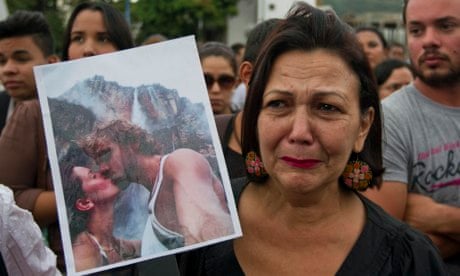'First time for everything," my British husband said, grimacing, while he was patted down for a concealed weapon as we stepped into a neighbourhood pizza restaurant. We were in Caracas, just before Christmas. Above the restaurant door was a now ubiquitous sign: "No Guns. No Smoking."
Venezuela, my home country, made headlines in Britain last week, for wretched reasons. Late last Monday a former beauty queen, Monica Spear, 29, and her British ex-husband, Thomas Henry Berry, 39, were murdered on a lonely stretch of highway in front of their five-year-old daughter. The couple were assaulted in an altogether too common way: an obstacle left in the road punctured the tyres of their car, forcing it onto the hard shoulder. A tow truck came to their rescue, but as their vehicle was being lifted to safety a gang of up to 11 people attacked
Their deaths have shocked and infuriated the already violence-numbed Venezuelans. Murders such as these usually go unreported on account of their tragic frequency, but Spear's fame made this different."We are all Monica," said a protester's poster in Caracas, as people gathered to mourn and voice their anger.
Last year Venezuela was branded the most dangerous country in Latin America. A 2010 UN report places it among the top four most murderous countries in the world. While the government has refused to release its own statistics for years, a recent report by an NGO, the Venezuelan Observatory on Violence, estimates that 24,000 people were murdered in 2013 alone, a 14% rise on 2012, with nine out of 10 homicides going unsolved.
And, despite recent government efforts to curb firearms, Venezuela is the most weaponised place in the world. In a country of 29 million people, there is roughly one gun for every two people.
As a child I camped in the southern grasslands with my family, we hiked in the Andes, through cocoa plantations and dense cloud forests, took dugout canoes through the Orinoco delta and slept in hammocks in the Amazon rainforest. The country is beautiful, but I am now too frightened to take my own children to see their spectacular heritage. Now when I take my own family back home, I rarely leave the confines of Caracas. If I do, I avoid driving at night and always travel in a nondescript car like the one Spear and Berry were sensibly driving. (Though even this precaution did not help them.)
The roads have always been badly kept and rarely lit, and drivers in Venezuela have scant regard for anything approaching rules. But as a teenager it was great fun to get stuck in traffic at night on a highway returning from some far-flung, palm-lined beach. Car doors would open, someone would crank up the merengue music on their stereo, and people would walk around, chatting, sharing food and beer.
Venezuela today is far from paradise lost but, regardless of the many important social and political changes brought about by 10 years of Bolivarian socialism under the late President Chávez, the level of violence is a bloody stain on his legacy. Supporters of Chávez would argue that his regime's efforts were focused on eradicating poverty and the causes of crime. Perhaps, but the reality is more guns and badly paid and corrupt law enforcement. Also possibly in play – in terms of the violence directed against the likes of Spear and Berry – is an institutional view that it is a "middle-class problem", a problem of the anti-Chavista social classes.
Last August I spent three weeks embedded with the anti-kidnap squad of the Caracas police making a documentary for the Channel 4 series Unreported World. I witnessed daily the unrelenting violence of Venezuela. On our first day in the dingy Caracas police HQ, Héctor Ramírez, head of the squad's technical unit, talked me through their investigation into a kidnap gang leader known as El Viejo. He showed me an image of one of El Viejo's alleged victims.
"This is how we found Celeste. Arms bound behind her back, T-shirt ripped off, one bullet to the back of the head. She was a 24-year-old university student caught in the wrong place at the wrong time," Ramírez said. "The kidnappers made one phone call to her family and realised she had no money. Her body was left on a dumpster just off a national highway." Three weeks later our Unreported World team joined the police on a raid into the Caracas slum of El Valle to arrest El Viejo.
Starting at dawn, we crept down steep mud paths between shacks as the sun rose over the valley. We hunkered down by a wall of concrete blocks in dirty grass as the police raced ahead of us, automatic gunfire whipping over our heads, the gangsters exchanging shots with the police. In the midst of the gunfire crackle, I heard whistling. On the other side of the concrete wall, I glanced up to see an old man – the whistler – sweeping his front stoop, talking quietly to his dog. Just another morning in a Caracas slum.
In Caracas before Christmas, that night my husband got frisked for weapons before dinner, I was heartened to see people out in the streets; a bar with tables overflowing onto the pavement, teenagers hanging out in a square, people walking on usually deserted streets. However, driving home I stopped at a red light. The cars behind me all honked their horns in fury. "What are you thinking?" they seemed to blare at me. Stopping at a red light on a dark Caracas night, what was I thinking indeed?
